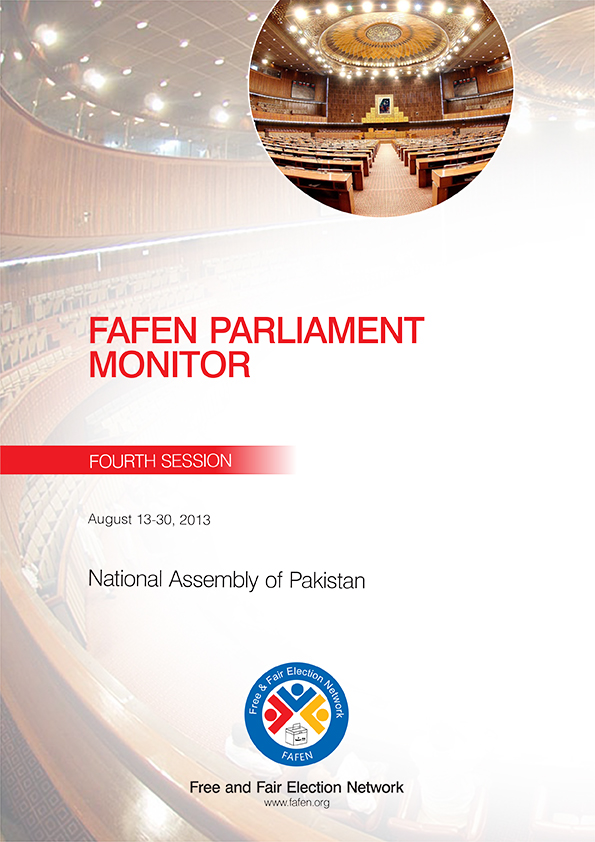Six bills introduced in the Senate here on Sunday. These bills include the ones seeking amendments to the constitution. More in this report.
ISLAMABAD, Sept 1, 2013: Six bills were introduced during the Senate’s 97thsession including three seeking amendments in the constitution, says Free and Fair Election Network (FAFEN) in its preliminary report on Sunday.
The constitutional amendment bills out of the six introduced call for amending articles 1, 51 and 106, and 140A to empower the parliament to \”create new provinces to allow the political parties to follow up on their election manifestos\”, provide for representation of workers in parliament and the provincial assemblies, and bind the Election Commission to hold regular elections of the local government bodies within a specified period respectively.
Six Bills Introduced Including Amendments to Constitution
Additionally, the Unattended Orphans (Rehabilitation and Welfare) Bill 2013, the Drug Regulatory Authority of Pakistan (Amendment) Bill 2013 and the Pakistan Pharmacy Council Bill 2013 were also introduced. The Civil Servants (Amendment) Ordinance, 2013 and the Electoral Laws (Amendment) Ordinance, 2013 were also laid before the House.
Six out of the 16 resolutions on agenda were adopted during the session. These included the Upper House condemning the Line of Control violations by the Indian armed forces and the crackdown in Egypt after the military\’s takeover and the call for eradicating sale of spurious and substandard drugs.
A debate on the presidential address to parliament’s joint session on June 10, 2013 was held for four hour and 40 minute. Out of 22 Senators who took part in the debate, 11 were from PPPP, four PMLN, three ANP, two MQM and a single Senator each from JUIF and BNPA.
Twelve walkouts Mar Session
Twelve walkouts were documented during the proceedings consuming two hours. ANP and MQM Senators separately walked out over the arrest of their party workers in Karachi. ANP Senators also staged a walkout when one of them was not allowed to ask a supplementary question. The JUIF protested the alleged rigging in by-polls while MQM and the entire opposition staged separate walk outs over the registration of FIR by the Balochistan government against ARY News over airing Ziarat Residency attack video.
Similarly, the opposition parties separately and individually staged walkouts over the Khyber Pakhtunkhwa\’s outstanding dues, postponement of by-elections in NA-25, ministerial absence and failure to respond to agenda, Balochistan police delaying registration of FIR on the killing of ANP lawmaker\’s cousin, missing BNPA leader and absence of Foreign Policy Advisor.
Six bills Introduced: PPP Senator Moves House
On an adjournment motion moved by PPPP Senator, the House discussed the armed standoff on August 15, 2013 on Islamabad\’s Jinnah Avenue. A total of 13 Senators, four each of PPPP and ANP and one each of BNPA, PkMAP and MQM spoke the incident. The Minister of Interior and Narcotics concluded the debate.
A privilege motion by a PPPP Senator against the Finance Division for misinforming him about security papers of Managing Director was referred to the relevant Standing Committee.
Low attendance persisted throughout the session. On average eight Senators were present at the beginning of each sitting, 23 at the adjournment and a maximum 40 Senators at any point during the proceedings. The quorum although lacking on various occasions was only pointed out once by a PPPP Senator.
The Leader of the House and the Leader of the Opposition attended all the sittings. The Chairman presided over 67% (20 hours and 21 minutes) of the session, the Deputy Chairman 16% while the remaining proceedings were chaired by the members of the Panel of Presiding Officers.
Two out of six calling attention notices about a rise in electricity prices and a proposal given to the Prime Minister to privatize Pakistan Steel Mills were taken up. The notices were addressed to the ministries of Water and Power and Industries and Production.
Eight Standing Committee Reports Presented
Eight Standing Committee reports were presented before the House; two each by the committees on Rules of Procedure and Privileges, Finance, Revenue, Economic Affairs, Statistics and Privatization, and Law, Justice and Parliamentary Affairs while Standing Committee on InterProvincial Coordination and Special Committee on mass transport system for Islamabad presented a single report each.
The Senate did not discuss six motions under rule 218 on the performance of Pakistan Railways, situation arising out of night phone call packages, Afghan foreign policy, outstanding payment to AFV rangers in Naushehra, appointment of superior court judges and the alleged irregularities /rigging in Elections 2013. A motion under rule 60 by a PPPP male Senator seeking details of suo motu action taken by high courts since 2009 was not taken up.
Out of 200 starred questions on the agenda, the house took up 67 as Senators asked an additional 120 supplementary questions.
While highlighting various regional and national issues, Senators spoke on 48 points of orders consuming 160 minutes (9% of the session time).
Disclaimer: This publication has been produced with the assistance of the European Union. The contents of this publication are the sole responsibility of FAFEN and can in no way be taken to reflect the views of the European Union. This preliminary report is based on direct observation of the Senate proceedings conducted by Centre for Peace and Development Initiatives (CPDI); a member organization of FAFEN. Errors and omissions excepted.


